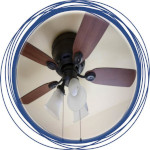Summer is here and the warm weather we’ve been waiting for after the cold winter. Many people think that electricity costs only rise during winter, but summer also features different energy use patterns that could influence our electricity bills. Heating and cooling costs accounts for about 17% of the home electricity consumption during evening peak periods. However, keeping your home cool doesn’t have to result in an increase in your electricity bill. Figuring out the best way to ventilate your home will result in serious savings and reduction in energy consumption. Here are couple of savings tips requiring minimal effort that will help you use only what you need, save on your electricity bill and help to save the planet.



